Assistant Professor Israel Balderas’ Media Law and Ethics class gathered with Assistant Professor Matthew Young’s Polarization & Civil Discourse class to engage in a thought-provoking discussion exploring contentious topics like book bans and their implications for intellectual freedom, equality and First Amendment protections.
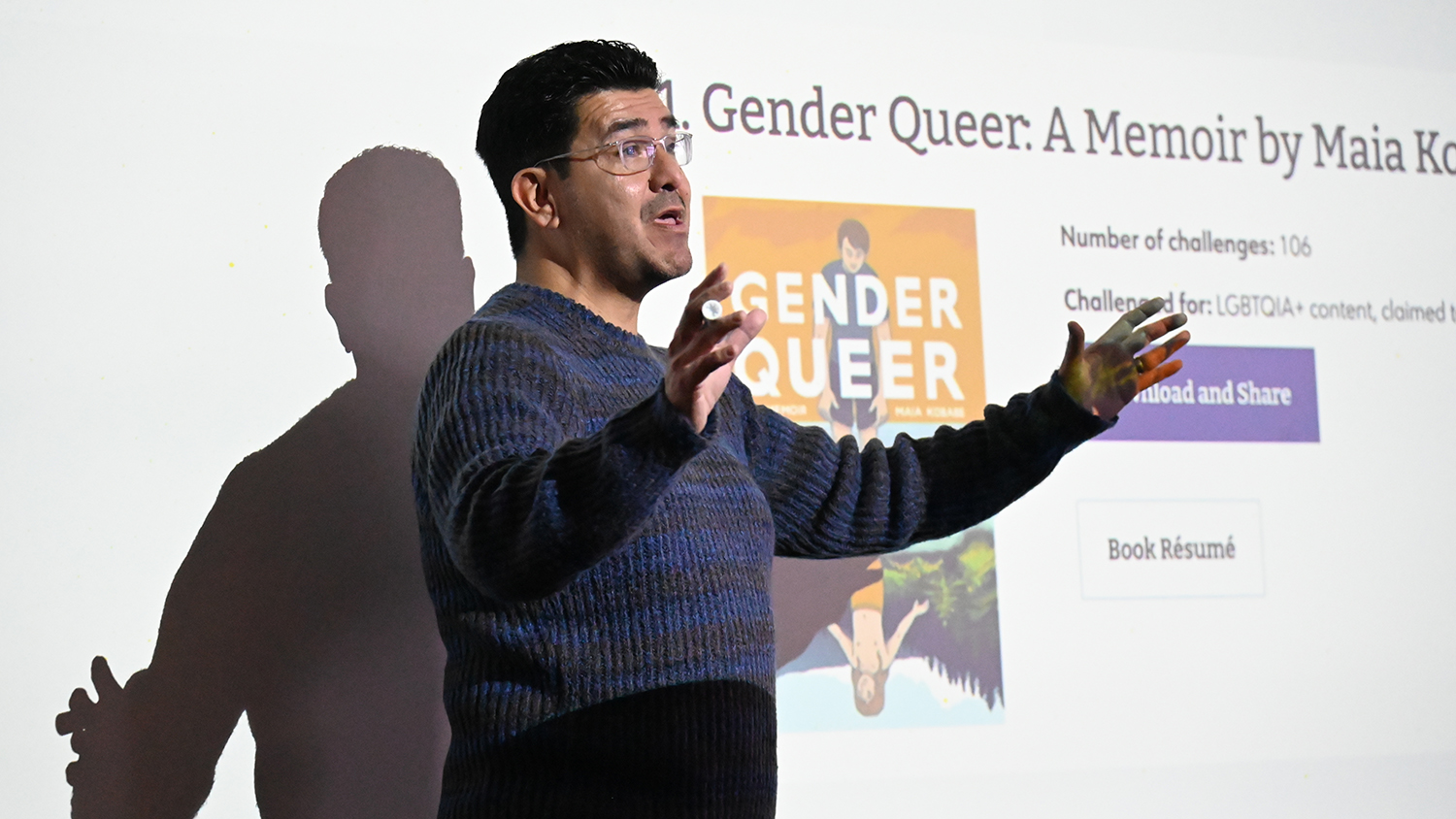
In the dimly lit, third-floor conference room in Sankey Hall, the video projector cast a dark shadow of Matthew Young’s frame, broadened by the shoulder pads of his sports jacket. While the assistant professor’s silhouette obscured some of the PowerPoint presentation from the 50-plus students in front of him, the headline “The Banned Book Dilemma” loomed large, same as the cover of Maia Kobabe’s book, “Gender Queer.”
The nonbinary, queer author’s memoir, which regularly tops the list of most scrutinized books since its 2019 publication, served as a critical talking point during a Jan. 6 class discussion featuring students from Assistant Professor Israel Balderas’ Media Law and Ethics course and Young’s Polarization & Civil Discourse class.
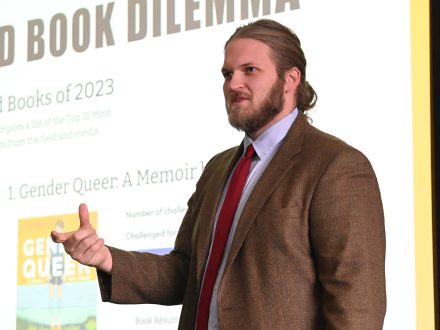
Through the bold interdisciplinary collaboration, the students explored complex issues like book bans, analyzing their effects on intellectual freedom, equality and First Amendment rights. Before the session, the professors emphasized that the joint exercise would showcase the importance of civil discourse and the value of “brave spaces” in encouraging meaningful and productive dialogue.
Photos of the banned book conversation are on the School of Communications Flickr account.
Using Duke University’s Civil Discourse Project framework, “Dialogue Across Differences,” Young and Balderas delved into the complexities of book bans, focusing on two controversial works: Kobabe’s “Gender Queer” and Abigail Shrier’s “Irreversible Damage.” These books, often at the center of heated public debates, provided a foundation for students to practice respectful disagreement, navigate differing perspectives, and reflect on their biases.
The topic was a chance delve into a larger, more concerning subject, Young explained. The conversation sought to examine and understand “ideological bubbles,” where people silo themselves, discouraging any opportunity for meaningful, thoughtful and important dialogue.
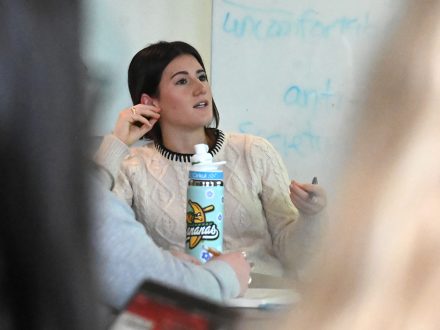
“Book banning is just one small piece of a much larger crisis in American politics today,” the political science and public policy professor said. “Almost across the board, Americans report that they struggle to talk to people who disagree with them politically. This class discussion was aimed at both the broader crisis our nation is experiencing with regards to civil discourse in a time of deep political polarization, and at a particular issue – book banning – that has become the site of particularly contentious politics in recent years.”
The collaborative discussion highlighted how human emotions like empathy, curiosity and frustration play critical roles in navigating difficult conversations. “Civil discourse isn’t just about legal principles or ethical frameworks; it’s about human connection and intellectual humility,” Balderas said.
As part of the exercise, the students were divided into four- and five-person groups, with each cohort adopting the viewpoint of a different audience – both left- and right-leaning perspectives. These audiences included educators, authors, parents and LGBTIA community members.
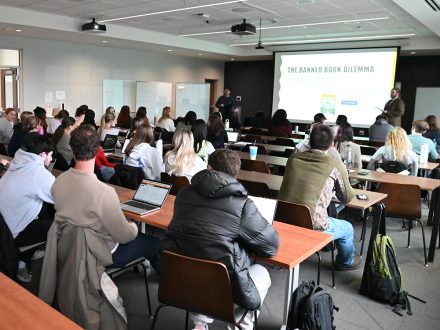
While the session aimed to model how discomfort can serve as a catalyst for intellectual and personal growth, Young admitted that he was anxious leading up to the discussion held on the second day of the Winter Term semester.
“I was worried, at first, that students might be hesitant to speak their mind in the larger classroom — or would respond poorly to the intellectual challenge,” Young said. “I was surprised and pleased with the enthusiasm, authenticity and vigor that students brought to the conversation. It takes courage to speak your mind in front of nearly 60 people.”
Charlotte McCormick, a senior enrolled in Young’s class, explained that she appreciated that the discussion provided a space for students to engage in uncomfortable conversations, explore different perspectives through role play, and consider legal issues around the First Amendment.
“When education has increasingly become about the next step toward a career, we forget about the importance of challenging our intellect, engaging with those who disagree with us, and asking ourselves questions that make our daily lives uncomfortable,” said the political science major. “This exercise allowed us all to be OK with not knowing the answers, and grappling with situations of other stakeholders and our own moral or political convictions.”
Celia Hearn ’26, a strategic communications and political science double major in Balderas’ Media Law class, echoed McCormick’s sentiment, acknowledging the importance of civility and understanding.
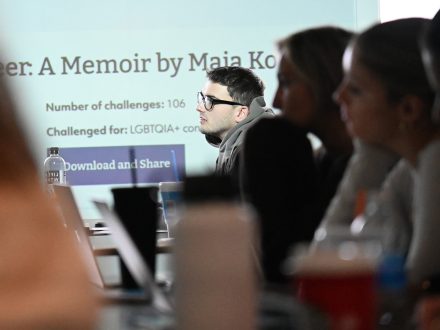
“In Media Law, we’ve talked a lot about the importance of protecting everyone’s right to have a voice, regardless of whether or not we agree with them,” Hearn said. “The point of this exercise, from my perspective, was to not only think critically about banned books and the First Amendment in a discussion, but to also practice having a productive, respectful conversation regarding a topic that can cause disagreement.”
Both Young and Balderas left the classroom exercise convinced that their joint discussion shows that bold and constructive discussions can take place when “students are hungry for real, unfiltered conversations,” Young said. They also agreed that the students gained better perspective because of their differences in ages, academic disciplines and personal viewpoints.
“While Israel and I teach in different disciplines, we share a common commitment to creating classroom environments that challenge our students to learn and grow through civil discourse and productive discomfort,” Young said. “Elon prides itself on engaged learning, and our students want more out of their education. It’s not enough to just memorize legal holdings or political facts. Instead, students want more conversations like this, that challenge them to be agile, apply their knowledge to real-world situations, and then rigorously think through the implications of their moral and ethical principles.”


